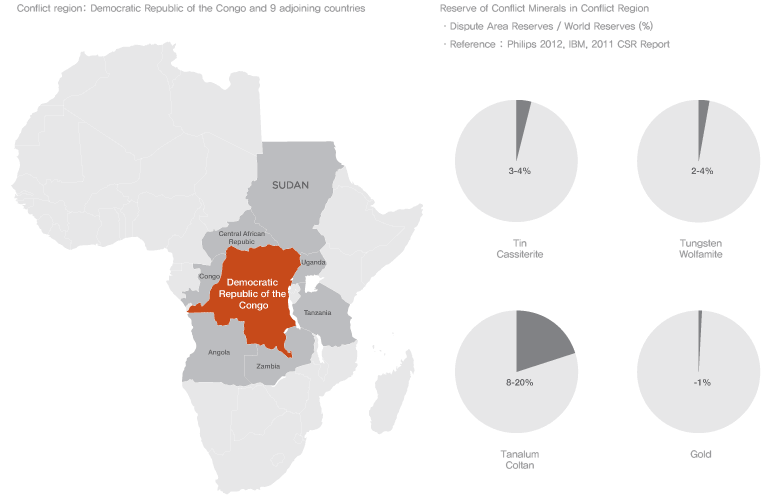Overview
Conflict minerals are the minerals such as the tin, tantalite, tungsten, gold, etc. which are extracted from the Democratic Republic of the Congo or adjoining countries which are involved in conflicts. The fund raised from the conflict minerals finances the armed groups in the conflict regions and can cause violation of human rights such as child labor, forced labor and abuse of women during the mining process. Amid the increasing international concern on it, the US Congress passed the Dodd–Frank Wall Street Reform and Consumer Protection Act which requires US listed companies to audit their supply chains and report conflict minerals usage to US SEC (Securities and Exchange Commission) under the provisions of Article 1502 of the law.

According to SEC's Conflict Minerals regulation, the conflict minerals are defined as follows
- Coltan, cassiterite, gold, wolframite and their derivatives
- Minerals designated by the US Secretary of State that profit the armed groups in the Democratic Republic of the Congo and adjoining countries
Dodd-Frank Wall Street Reform and Consumer Protection Act
- A financial reform law passed by the US Congress in 2010 to prevent reoccurrence of financial crisis occurred in 2008. It is called the largest financial reform act since the Great Depression. The law stipulates strengthening of regulation and supervision of major financial companies, reformation of financial regulating agencies, etc.
Conflict Minerals Policy
Conflict Minerals Management Policy of INTOPS.
INTOPS established the conflict minerals management policy to comply with the law and fulfill its social responsibility. To ensure that the conflict minerals linked with armed groups in the conflict region are not included in the supply chain for manufacturing its products, INTOPS demands its vendors to establish the conflict minerals policy and procedure as well as the conflict minerals usage survey and risk response procedure policy, It also assists the vendors to purchase the materials from the smelting works free of conflict minerals. INTOPS intends to actively participate in international efforts of prohibiting the use of conflict minerals jointly with vendors and customers and fulfill its social responsibility to protect the human rights of the Democratic Republic of the Congo and adjoining countries.
View details of INTOPS'S Conflict Minerals Management Policy
Conflict minerals refer to tantalum, tungsten, tin, and gold originated in the Democratic Republic of the Congo and its adjoining countries ("Covered Countries"). There are concerns that the conflict minerals fund armed forces of the Covered Countries causing many deaths of their own people and infringement of human rights in the course of mineral excavation such as forced labor and abuse of women and children. In response to these concerns, the United States Congress enacted the Dodd–Frank Wall Street Reform and Consumer Protection Act (the "Dodd-Frank Act"). Section 1502 of the Dodd-Frank Act ("Conflict Minerals Rule") requires manufacturing companies listed in U.S. Stock exchange to disclose whether the products they manufacture or contract to manufacture contain conflict minerals.
As a responsible corporate citizen, INTOPS's policy is to eliminate the use of conflict minerals contained in our products that directly or indirectly finance or benefit armed groups in the Covered Countries.
In support of our Conflict Minerals Policy, INTOPS will:
- Implement procedures compliant with and in support of the activities of the EICC-GeSI Conflict Free Sourcing Initiative and the OECD Due Diligence Guidance.
- Endeavor to trace the conflict minerals back to the source, at least to the smelter or refiner level through use of the EICC- GeSI Conflict Minerals Reporting Form.
- Require our suppliers to submit the Form or otherwise verify in writing that all products supplied to Intops do not contain conflict minerals from the Covered Countries that directly or indirectly finance or benefit armed groups in those Covered Countries.
- Direct our suppliers, whenever possible, to source conflict minerals from the smelters validated through EICC/GeSI Conflict-Free Smelter Program. (The list of conflict-free smelters is available here.)
INTOPS also requires its suppliers to familiarize themselves with the Conflict Minerals Rule and expects our suppliers to adhere to the Conflict Minerals Rule and INTOPS's Conflict Minerals Policy to ensure alignment throughout their own supply chain.
INTOPS expects and will obligate our Suppliers to:
- Have a documented conflict mineral policy and procedures to ensure that all products supplied to INTOPS do not contain conflict minerals from the Covered Countries that directly or indirectly finance or benefit armed groups in those Covered Countries.
- Identify through reasonable efforts, all smelters that supply conflict minerals in their supply chain are expected to submit a complete Form containing conflict minerals information in a timely manner to INTOPS.
- Correct promptly any risk identified in their supply chain.
Should INTOPS come to know or have reason to suspect that a supplier is procuring conflicts minerals from a Covered Country that directly or indirectly finance or benefit armed groups in those Covered Countries, INTOPS will notify such supplier in writing and give the supplier reasonable time to cure the non-compliance and submit documentation showing the non-use of such conflicts minerals. If the supplier does not cure or cannot provide proper documentation evidencing a change in the sourcing of conflicts minerals, or is found to have provided false records or information at any time, INTOPS may terminate its business with that supplier.
